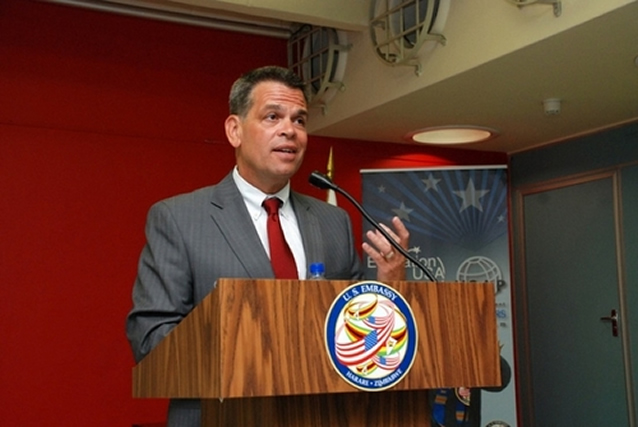US admits embargo impact

 Senior Reporter
Senior Reporter
The United States has admitted that the illegal sanctions it imposed on Zimbabwe hurt the country though they have been claiming that they were only targeted on individuals and companies linked to Zanu-PF.
According to the Zanu-PF manifesto for the July 31, 2013 harmonised elections, Western countries’ illegal economic sanctions regime cost Zimbabwe at least US$42 billion since 2001, with negative effects on vulnerable groups that saw their livelihoods decline to pitiable levels.
The US passed into law Zimbabwe Democracy and Economic Recovery Act in 2001 with the then President George W. Bush saying the development was meant “to effect peaceful democratic change, achieve economic growth, and restore the rule of law” in Zimbabwe.”
Speaking at an Editors’ luncheon, he hosted in Harare yesterday, US Ambassador to Zimbabwe Bruce Wharton acknowledged the illegal sanctions his country imposed on Zimbabwe had “served the purpose”.
“Targeted sanctions we started that in 2003 because we were concerned about the way we thought the democratic process was going, rule of law and human rights issues.
“Our targeted sanctions which make it difficult for those people to travel to the United States and makes it illegal for Americans to do business with those people were intended to bring pressure on the people in Zimbabwe that we thought had the power to make this country weaker or stronger.
“To some extent, I think they have been successful in that it remains a huge talking point. People talk about sanctions all the time which indicate that it succeeded at least in getting people’s attention. So to that extent, I think it’s credible to say that to some extent they served the purpose.
“I think the question now is whether they still make sense. I also think that it’s very important for the United States to continue to review and revise those sanctions.
“Things that were appropriate in 2003 or 2008 may no longer be appropriate,” said Ambassador Wharton.
He said it would take both the US and Zimbabwe to normalise relations between the two countries.
“So I think we all have to adjust the way we talk about each other. I do everything that I can to make sure Washington has accurate information, credible information about what is happening in Zimbabwe.
I do not wish to demonise Zimbabwe and I think we have succeeded in reducing some of that misperception. But on the other hand, I don’t want my President or Government to be demonised either,” said Ambassador Wharton.
He said the US also acknowledged that there was no going back on the land reform and redistribution exercise.
As a result, his country would continue to support smallholder farmers to ensure food security.
Ambassador Wharton said Zimbabwe was a peaceful country where he has felt very safe compared to a number of countries that he has lived in.










Comments